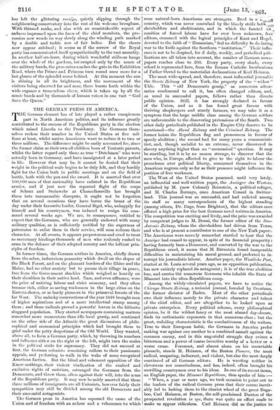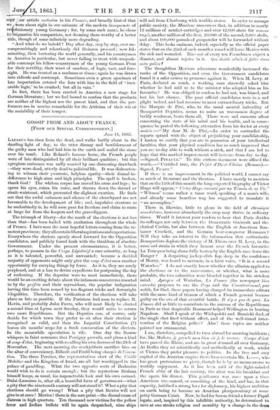THE GERMAN PRESS IN AMERICA.
711HE German element has of late played a rather conspicuous 1 part in North American politics, and its influence greatly contributed to the success of the Republican party in the election which raised Lincoln to the Presidency. The Germans them- selves reckon their number in the United States at five mil- lions at least, whilst native Americans want to reduce it to two or three millions. The difference might be easily accounted for, since the former claim as their own all children born of Teutonic parents, whilst the latter regard only those as true " Dutchmen" who were actually born in Germany, and have immigrated at a later period in life. However that may be, it cannot be denied that their weight in the political scale begins to be duly felt, and they hardily fight for the Union both in public meetings and on the field of battle, both with the pen and the sword. It is asserted that over 100,000 men of that nationality have enlisted in the Republican armies, and if just now the reported flight of the corps of Schurz and Steinwehr at Chancellorsville has brought them into unreasonabie disrepute, it ought not be forgotten that on several occasions they have borne the brunt of the day under their favourite leader, General Sigel, who, unhappily for himself and his countrymen, was induced to resign his com- mand several weeks ago. We are, in consequence, entitled to expect that the Germans, who are generally endowed with many military qualities, as is sufficiently testified by the eagerness of potentates to enlist them in their service, will soon redeem their character. At all events, it appears preposterous and cruel to treat as mercenary hirelings thousands of men who zealously rushed to arms in the defence of their adopted country and the loftiest prin- ciples of freedom.
In former times, the German settlers in America, chiefly drawn -from the sober, industrious peasantry which dwell on the slopes of the Black Forest, and on the pleasant borders of the Rhine and the Maine, had no other anxiety but to pursue their tillage in peace, free from the Government shackles which weighed so heavily on their shoulders in their native land. Ease, and even affluence, were the price of untiring labour and strict economy, and they often became rich, either as saving tradesmen in the large cities on the Eastern shores, or as hardy pioneers in the primaeval forests of the far West. The unlucky insurrections of the year 1848 brought men of higher aspirations and of a more intellectual stamp among them ; and these radicals proved a powerful leaven in the hitherto sluggard population. They started newspapers containing matters somewhat more momentous than idle local gossip, and continued on the other side of the Atlantic the great discussions of philo- sophical and economical principles which had brought them to grief under the petty despotisms of the Old World. They wanted, above all, to form a German party, which, by throwing its numbers and influence either on the right or the left, might turn the scales in the political strife for supremacy. They did not succeed at first, the German colonists remaining callous to their passionate appeals, and preferring to walk in the wake of some recognized American faction. But the blind and vehement opposition of the Know-nothings, their violent vindication of the exalted and exclusive rights of nativism, estranged the Germans from the Democrats, and threw them, often against their will, into the arms of the Republican party. It may now be safely asserted that these three millions of immigrants are all Unionists, however fairly their sympathies may still be divided among the old Democrats and their successful antagonists.
The German press in America has espoused the cause of the Union and of freedom with an ardour and a vehemence to which
even country, which was never convulsed by the bloody strife betw‘em slaveholders and abolitionists, and in which the fancied r.:s, cessities of forced labour have for ever been unknown, free editors, crammed with the logical principles of Kant and Hegel, devoted to the faith of " Humanism," feel no difficulty hi deviating war to the knife against the Southern "institution." Their influ- ence is not to be despised, for if daily, weekly, and periodical pub . lications are all taken into account, the number of German news- papers reaches close to 200. Every party, every shade, every school is represented here, from the Roman Catholic lucubrations of Father Oertel to the materialist declamations of Karl Heinzen.
The most wide-spread, and, therefore, most influential journal the Stoats Zeitung of New York, the property of the " widow " Uhle. This " old Democratic gossip," as numerous adver- saries condescend to call it, has often changed editors, and, as usual in successful papers, follows rather than directs public opinion. Still, it has strongly declared in favour of the Union, and as it has found great favour with thriving shopkeepers and sturdy farmers, we may take it as a symptom that the large middle class among the German settlers are unfavourable to the dissevering pretensions of the South. Two other daily periodicals published in the Empire City deserve to be mentioned—the Abend Zeitung and the Criminal Zeitung. The former hoists the Republican flag and pronounces in favour of speedy abolition ; the second had for many years a communistic tint, and, though socialist to an extreme, never discovered in slavery anything higher than an " economical " question. It may be startling, but it is by no means strange, to discover that the men who, in Europe, affected to give to the right to labour the precedence over political liberty, concerned themselves in the American negroes only so far as their presence might influence the position of free workmen.
Tile West of the United States possessed, until very lately, an influential and well-written paper, the Anzieger des Westens, published by M. (now Colonel) Bornstein, a political refugee, and M. Charles Bernays, once American Consul in Switzer- land. This journal was so successful, and had enlisted among its staff so many correspondents of the highest standing (among others, Dr. Ruge, from Brighton), that the editors once offered a high price for the best German novel written in America. The competition was exciting and lively, and the prize was awarded by competent judges to M. Douai, the former editor of the San- Antonio Zeitung, whom the slaveholders had driven from Texas, and who is at present a contributor to one of the New York papers. The Americans were secretly somewhat startled to hp.ar that the Anzeiger had ceased to appear, in spite of its financial prosperity ; having formerly been a Democrat, and converted by the war to the Republican creed, it seems that M. Bornstein found insuperable difficulties in maintaining his moral ground, and preferred to in- terrupt his journalistic labour. Another paper, the TVestliche Post, started at St. Louis several years ago, as an opposition publication, has now entirely replaced its antagonist; it is of the true abolition hue, and carries thA numerous Germans who inhabit the State of Missouri into the ultra-Republican camp.
Among the widely-circulated papers, we have to notice the Chicago Stoats Zeitung, a unionist journal, founded by Brentano, the former dictator of Baden. Most of the other periodicals owe their influence merely to the private character and talent of the chief editor, and are altogether to be looked upon as private enterprises. Every political scheme, every philosophical opinion, be it the wildest fancy or the most absurd day-dream, finds its enthusiastic exponents in that numerous class ; but the great, unfailing characteristic is the combativeness of the writers. True to their European habit, the Germans in America prefer making war against one another to a combined assault against the common enemy, and in this ungrateful struggle they evince a bitterness and a power of coarse invective worthy of a better or a worse cause. Foremost, and almost alone on his unenviable pinnacle, stands M. Heinzen, of the Boston Pioneer, the most radical, unsparing, indiscreet, and violent, but also the most deeply convinced of all German editors. He is wanting neither in cleverness nor conceitedness, and has, indeed, often brought his unwilling countrymen over to his ideas. In one of its recent issues, an English paper, the Missouri Republican, thus speaks of him :- "When, a year or more ago, we took occasion to point out to the leaders of the radical German press that their course inevit- ably led to lashing them to the chariot wheel of the great Buga- boo, Carl Heinzen, at Boston, the self-proclaimed Danton of the prospected revolution in spe, there was quite an effort made to make us appear ridiculous. Carl Heinzen did us the justice to copy ,:atir article verbatim in his Pioneer, and broadly hinted that we /were about right in our estimate of the modern lansquenets of
I
re lutionary young Germany ; for, by some such name, he chose le• t tigmatize his compatriots, not deeming them worthy of a better title, though of some infinitely more degrading.
"And what do we behold ? Day after day, step by step, ever un- compromisingly and relentlessly did Heinzen proceed ; now ful- minating, then hectoring the world generally, and his countrymen in America in particular, but never failing to treat with unspeak- able contempt his fellow-countrymen of the young German Press for their servility, their want of candour, of logic, tact, and fore- sight. He was treated as a madman at times ; again he was drawn into ridicule and contempt. Sometimes even a green specimen of late importation entered the lists with him in the field of ' inex- orable logic,' to be crushed; but all in vain."
In fact, there has been erected in America a new stage for German literature ; but we feel bound to confess that the products are neither of the highest nor the purest kind, and that the per- formers are in nowise remarkable for the Atticism of their wit or the amiability of their temper.































 Previous page
Previous page